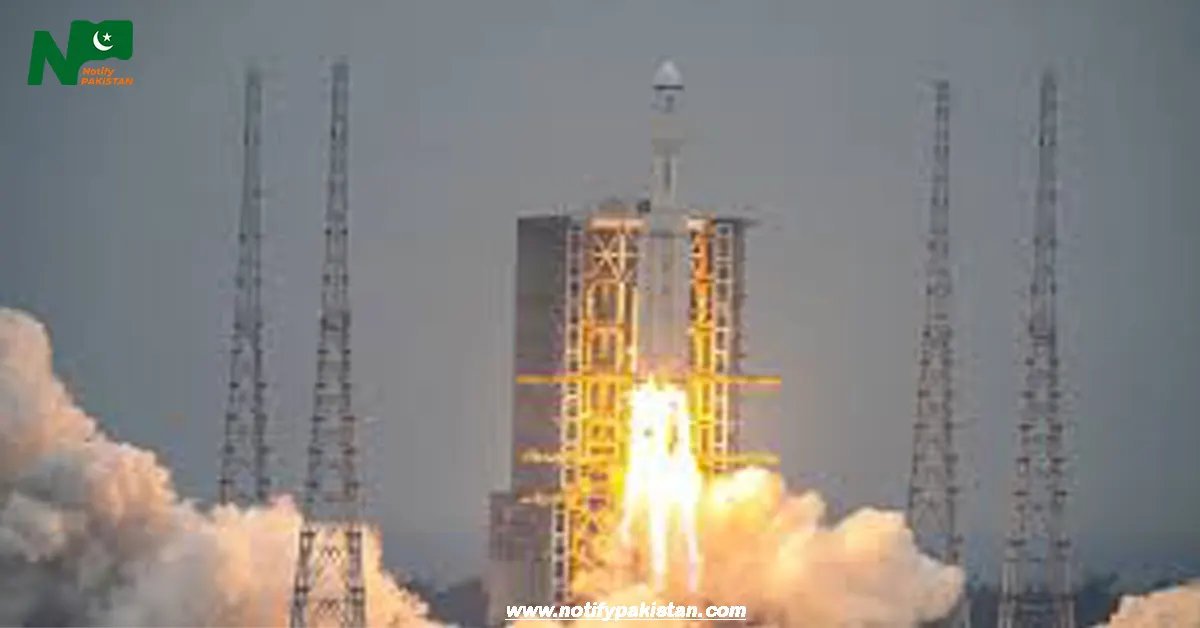Karachi: Pakistan made history by launching its first satellite (ICUBE-Qamar) towards the moon through China’s space craft, crossing a historic milestone. After the launch of this important mission, Pakistan became the sixth country in the world to launch a lunar satellite.
Pakistan’s historic space mission was sent towards the moon from the Hainan Space Launch Site in China on Saturday afternoon. The satellite has been prepared during long and painstaking phases by the Shanghai University of China, Pakistan’s Institute of Space Technology, and SUPARCO. Spectators witnessing the launch live at SUPARCO headquarters in Karachi cheered with slogans of “Pakistan Zindabad” as they directly witnessed the scenes of the launch.
According to Syed Shafqat Ali, Director of the Institute of Space and Technology Pakistan, in an interview with Express News, the Pakistani satellite mission ICubeSat is nearing completion and will be effective for research purposes for a minimum of three to six months. He stated that the historic Pakistani satellite mission to the moon carries dual optical cameras which will capture images of the moon from various angles, transmitting them to the ground station. These images will be instrumental in research activities and will assist future missions to the moon.
Related News: IMF Provides Pakistan with $1.1 Billion Funding
Syed Shafqat Ali further mentioned that the ICUBE-Qamar sent to orbit the moon will travel a distance of 384,000 kilometers. The design of ICUBE-Qamar was done by the Institute of Space Technology Pakistan, while it was prepared in collaboration with China’s Shanghai Jiaotong University and Pakistan’s national space agency SUPARCO.
According to the Director of the Institute of Space and Technology Pakistan, Samar Abbas, besides two cameras for capturing the surface of the moon and the earth, onboard computers, thermal control, telemetry, and telecommand, among other instruments, are installed for obtaining images and data.
He explained that ICUBE-Qamar are small artificial satellites that are noticeable due to their small size and standardized design. Their weight is mostly less than a few kilograms, and they are deployed in space for various purposes. The primary purpose of ICUBE is to facilitate scientific research in space, advance technology, and provide educational opportunities.
He further explained that these artificial satellites are used for a wide range of missions, including Earth observation, remote sensing, environmental research, communications, astronomy, and technology. Due to their relatively low cost compared to traditional satellites, ICUBE-Qamar provide universities and research institutions with opportunities to participate in space missions and gather scientific, developmental, and valuable data.
According to the officials at SUPARCO, the mission is expected to reach the moon on May 8th and will later begin orbiting the moon to capture images of its surface and the Earth. It will also gather data on the lunar magnetic field.
The important objectives of the ICUBE-Qamar mission include planning for future lunar landings, identifying potential risks at landing sites during robotic missions, and obtaining vital information and resources required for those missions. The analysis of images obtained from the moon’s surface will enable Pakistani scientists to identify potential resources such as water, ice, or minerals.
During these phases, with the passage of time, insights into lunar mysteries, such as any changes, their effects, and environmental factors, will be provided.
ICUBE-Qamar marks Pakistan’s first step in deep space exploration, which will enhance its scientific capabilities and pave the way for discovering significant factors in a systematic manner.

